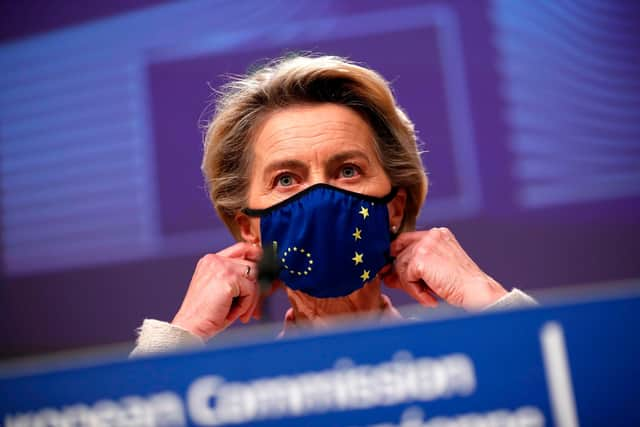Scottish independence in the EU would leave Scots with less control over their affairs than within the Union – Professor Vernon Bogdanor
Until around 1989 the SNP was indeed a separatist party. Since then, however, it has abjured separatism and now favours an independent Scotland within the European Union.
This conversion is difficult to understand. In the 1975 referendum, the SNP was the only party in Scotland advocating Britain’s departure from the European Community, as the European Union then was.
Advertisement
Hide AdAdvertisement
Hide AdSo it favoured Scotland leaving the loosely organised Europe of the 1970s but remaining in a more tightly integrated one 50 years later. It was as if during the interval nationalists had lost confidence in Scotland’s ability to run her own affairs and needed an outside guarantor to help.
But would independence in Europe allow Scots to “take back control”, to adapt a phrase? It seems unlikely. Indeed, Scotland would probably have less control than she has now.
She is currently represented at Westminster by 59 MPs – one in 11 of the total – in the Commons. She has a good chance of being able to determine the colour of the next British government – as she did during the premierships of Harold Wilson and Tony Blair. She could be crucial in the next general election.
To form a majority government, Labour needs to recover in Scotland. If there is a swing to Labour but the party falls short of a majority, there could be a hung parliament in which the SNP would probably hold the balance of power. Meanwhile Scottish MPs can and do vigorously scrutinise government policy at Westminster.


Daring to give advice to Scots
Brexit has increased the power of Scotland’s own parliament in domestic affairs, primarily in agriculture and fisheries – not as much as most Scots would like, but still an improvement on the position when Britain was in the EU and Scotland was subject to the common agriculture and common fisheries policies.
Were Scotland to re-enter Europe, she would again be subject to these policies. But not only these policies. For the powers of the European Union are not a closed category, which can be defined in advance. There is no inherent limit to the powers which the European Union can acquire.
Covid has led to an extension of the European Union’s reach with the 750 billion euro recovery fund; and the European Union is contemplating new economic and fiscal powers to strengthen the euro.


The more powers the EU acquires, the more remote it becomes from the voters, and the less power remains with Scotland. Indeed, Scotland’s control of taxation in the EU might well become less than it is now when it has in effect powers to determine income tax rates. What, after all, would be left for Scottish voters to decide if, as well as monetary policy, the budget, taxation and economic policy had all been transferred to the EU?
Advertisement
Hide AdAdvertisement
Hide AdNationalists of the cruder sort sometimes berate me as an Englishman for daring to give advice to Scots. But, with an independent Scotland in the EU, foreigners would be doing more than giving advice. They would be making law for Scotland and the Scots would have no alternative but to obey.
But Scotland, it might be said, will be represented in EU institutions. The powers of the Scottish government, however, will be shared with 27 other governments over whom she will have no influence. And one in 28 is a smaller proportion than the one in 11 at Westminster, a Parliament in which she can exert influence.
A democratic deficit
The interests of many of the other 27 will be far more removed from those of Scotland than the interests of England are. And if the European Union makes a decision that Scots do not like, the Scottish Parliament would not be able to do anything about it. Holyrood would become a mere commentator on EU policies.
Nor could Scottish voters do anything about it. Even if they changed their government, it would make no difference. The Scottish people would not be able to say: "We do not like what the European Union has decided. We would like a change of policy or a change of government.”
The inept activities of Ursula von der Leyen and the European Commission over vaccination form a graphic illustration of what happens when political decisions are made by those who do not have to run the gamut of parliamentary and electoral scrutiny.
Under a system of parliamentary accountability, those who have made such mistakes would be subject to an immediate vote of no confidence. That has not happened with Ms von der Leyen, whose name was not even before the voters in the 2019 European Parliament elections. It is hardly a wonder that the democratic deficit in the EU has led to the rise of populist parties on the Continent.
Many Scots believe that their governing principle is not the sovereignty of Westminster but the sovereignty of the Scottish people. Returning to the EU would threaten that principle far more than retaining Scotland’s position in the Union in conjunction with a powerful Parliament of her own, giving her the best of both worlds.
The Union has lasted over 300 years, and has great achievements to its credit. Of course, as with any marriage, there have been rocky moments and it is easy for the Scots and the English to become irritated with each other. But it is foolish to end a marriage just because of the odd rocky moment. Besides, would anyone of sense want to end a long-standing marriage in order to form a partnership with 27 mistresses, some of whom one hardly knows?
Advertisement
Hide AdAdvertisement
Hide AdVernon Bogdanor is professor of government at King’s College, London. His books include Devolution in the United Kingdom and Beyond Brexit: Towards a British Constitution.
A message from the Editor:
Thank you for reading this article. We're more reliant on your support than ever as the shift in consumer habits brought about by coronavirus impacts our advertisers.
If you haven't already, please consider supporting our trusted, fact-checked journalism by taking out a digital subscription.
Comments
Want to join the conversation? Please or to comment on this article.